
views
Eliminating the Odor
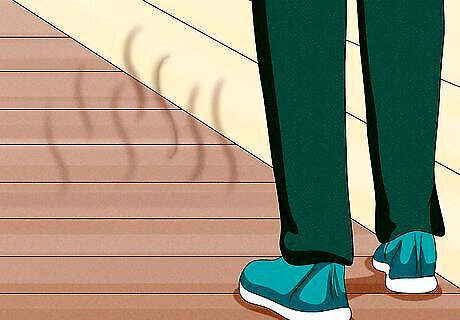
Locate the animal. Follow your nose to the source of the smell. Narrow it down to an area of your house (such as your basement or attic). From there, let your nose guide you to where the smell is strongest. You may have to do some investigating if the animal didn't perish out in plain sight. Check in places like: Behind walls (you may have to cut a few holes) Under floor boards Under or behind insulation Under piles of debris Near warm air vents or heat sources Close to plumbing or water sources
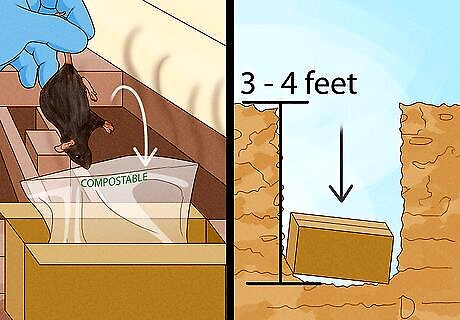
Get rid of the source of the odor. What you do with the body will depend on the local bylaws in your municipality, but your options include burying, burning, and throwing the body in the trash. Don't touch the animal directly: either wear gloves or use a shovel to move the carcass around. If you can bury the animal, place it in a compostable bag and then into a small box. Consult area maps or your local zoning office to be sure you aren't going to hit any pipes or water lines. Dig a hole three to four feet deep, place the box at the bottom, and fill the hole back in. Your municipality might allow burning, in which case you can burn the body on a bonfire. To dispose of the body in the garbage, wrap the body in newspaper, then double bag it in sealable plastic bags before throwing it in the trash. You may also be able to call an animal control service to pick up the body, or you may be able to drop the carcass off for them to dispose of.
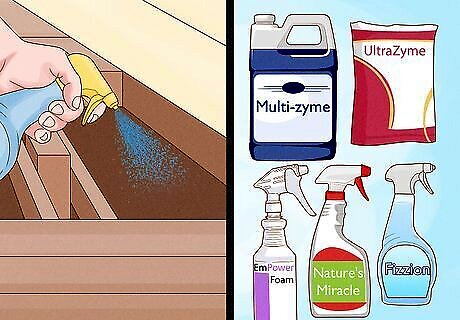
Clean and sanitize the area. With gloves on, use a rag or paper towels to pick up any leftover fur, juices, or anything else left behind by the animal. Spray the area with an enzymatic cleaner, which will break down the organic materials and eliminate diseases and odors. Let the solution sit for 10 to 15 minutes before wiping the area with a clean rag and disposing of the rags and waste. Enzymatic cleaners include: Ultrazyme Multi-zyme EmPower Foam Nature's Miracle FizzionTip: You can also sprinkle powdered hydrated lime to neutralize the acids that produce these bad odors.
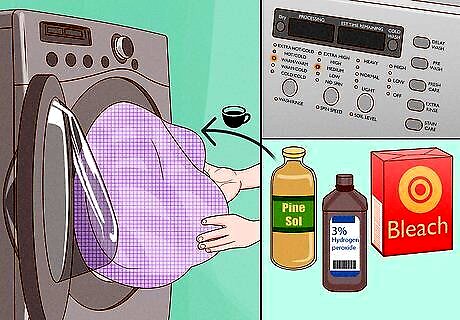
Clean fabrics. Any fabrics that were contaminated by the dead animal—such as curtains, clothes, linens, or other materials—should be sanitized and cleaned as well. The best way to do this is to bring them to the dry cleaner. If that is not an option, you may do so in your washing machine, using hot water on your regular cycle with an added one cup (240 ml) of either: Hydrogen peroxide Bleach Pine-Sol
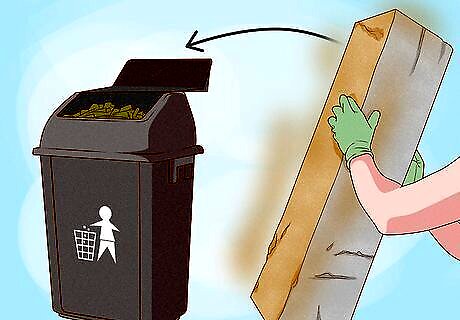
Discard materials that can't be cleaned. Sometimes, animals die in areas that are difficult to clean, such as on top of insulation. If this is the case, remove the material that cannot be properly cleaned and replace it.
Freshening the Air
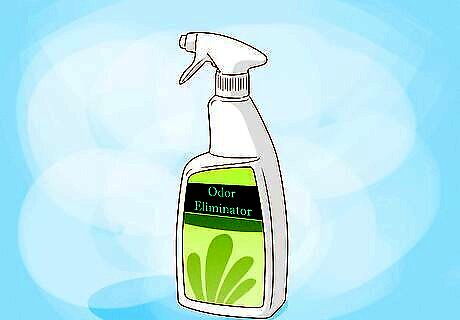
Know what to do if you can't locate the animal. If the animal died in an inaccessible place—such as inside a wall—you may not be able to remove the body to get rid of the odor. The time it takes for decomposition and the smell to dissipate will depend on the size of the animal, the temperature, and the humidity, but it could take several weeks or even months. Locate the general vicinity of the source of the smell. If necessary and possible, drill a few holes to open up the area where the animal is (such as under floorboards or behind a wall) so that you can treat the area with a disinfectant or odor eliminator. Use a strong odor eliminator or disinfectant in the area. You can do this by spraying a product like Bac-Azap into the holes or hanging Earth Care Odor Remover Bags or Smelleze around. Replace the bags as necessary or continue spraying the eliminating spray until the decomposition has finished. Plug up the holes once the smell is gone.
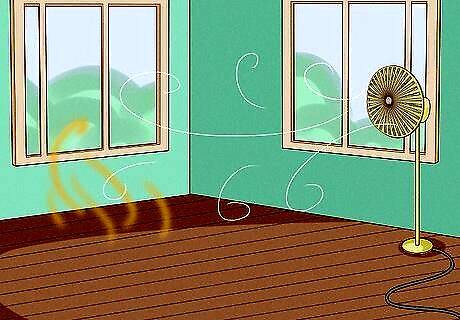
Ventilate the area. Whether you've removed the source of the smell or you're waiting it out, ventilation is key to freshening the air and helping eliminate bad odors. Open as many windows as possible in the area to get the air moving. Set up a few fans to blow air from inside the house out the windows. This is especially important if you can't remove the animal.
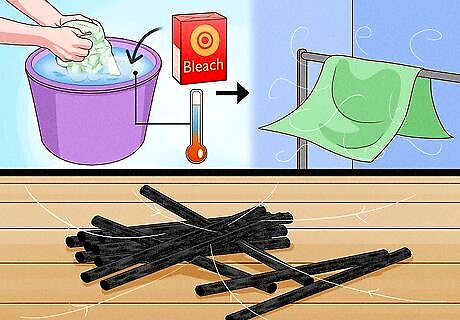
Deodorize the air. There are many deodorizing products you can use to help neutralize and eliminate the smell that's lingering in your home. You can absorb and eliminate odors with: Bleach-soaked rags (Soak some rags in a bucket of hot bleach water. Squeeze the liquid out and hang the bleach rags safely in the area. Replace as they dry out. Keep the area well ventilated, and keep children and pets away from the area.) An open box of baking soda A container of freshly ground coffee with holes in the lid Charcoal (Buy 3 or more charcoal stink bags from an outlet like Amazon.) An air filter with an absorbent filter
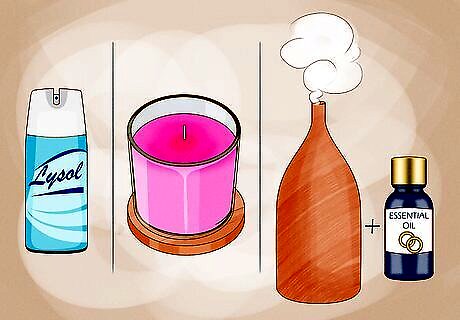
Freshen the air. On top of neutralizing the smell of dead animal with deodorizers, you can also improve the smell in your home by using air-freshening products, such as: Store-bought aerosol sprays or mists, such as Lysol or Febreze Scented candles Essential oils in a diffuser, on cotton balls, or mixed with water or alcohol and poured into a mister or spray bottle Incense or essential oils Hanging air fresheners Cloth pouches filled with potent fresh herbs, such as rosemary and lavender.
Keeping Animals Out
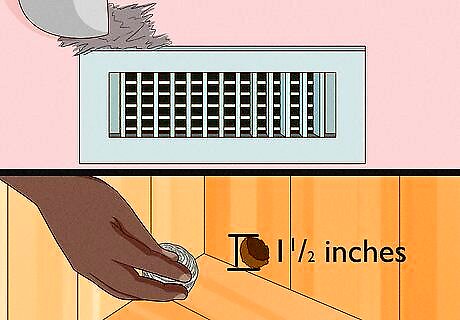
Cover up holes and entry points. Animals can get in to your house through holes, cracks, vents, and other openings, and the best way to prevent them from getting inside and dying in your home is to cover these entry points. Be sure to cover holes larger than one half-inch (1.25 cm) in diameter, vents, chimneys, crawl spaces, gaps, and cracks. Use materials such as concrete, metal wire, and mortar, otherwise animals will chew through the materials to gain entry into your home.
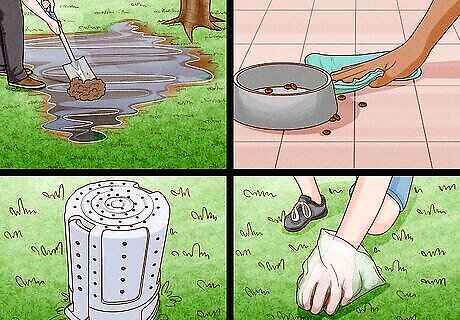
Clean up food sources. Animals will be more likely to come into your home if they are attracted to something outside it, such as food or water. To remove these attractants, you should: Remove standing water from around your home Clean up birdseed and pet food Store garbage and compost in rodent-proof containers Pick up fallen fruits and vegetables from the garden Pick up pet droppings
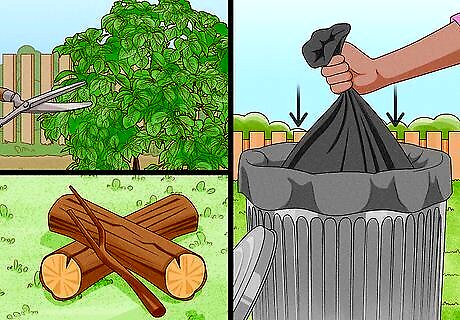
Remove debris from around your home. Piles of wood, trash, overgrown bushes, and overhanging branches can all be used by animals as either shelter or ways to access otherwise inaccessible parts of your home. Be sure to clean up debris from around your home and keep plants, trees, and grasses cut back and maintained. For instance, a thicket of overgrown bushes might make a great place for a rodent to make a nest. Branches hanging over your house might allow animals to access your home from the roof. Similarly, debris, garbage, and organic matter piled up against your home could give animals access to higher entry points they wouldn't be able to reach.



















Comments
0 comment